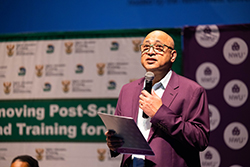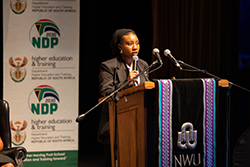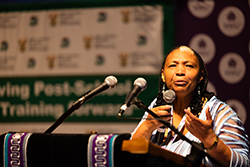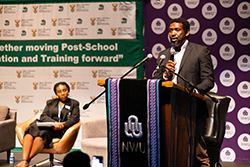On 13 November, the North-West University (NWU), in collaboration with the Department of Higher Education and Training (DHET), Higher Health (HH) and the Vuselela Technical Vocational Education and Training (TVET) College, hosted a gender-based violence (GBV) and femicide assembly.
The event took place at the Sanlam Auditorium on the Potchefstroom Campus, and it was aimed at raising awareness of the fight against GBV and encouraging collaboration to eliminate violence on the campuses of higher-education institutions.
The event was a poignant occasion in the light of the recent GBV incident in which a female student at the Cape Peninsula University of Technology was allegedly stabbed by her husband.
Prof Daryl Balia, the deputy vice-chancellor for information technology and Potchefstroom Campus operations (Potchefstroom Campus), welcomed the guests and highly acclaimed speakers and emphasised the significance of the event.
“GBV and femicide are a depressing issue,” he said. “It is important for us to acknowledge the impact they have on our journey towards achieving Sustainable Development Goal number 5: to achieve gender equality and empower all women and girls by 2030.”
Priscilla Lehoko, the principal of the Vuselela TVET College, spoke on the recently introduced Civic Education and Health Skills Programme implemented by HH.
The programme is designed to address many personal and social challenges, and it covers modules relating to GBV, gender diversity and equality, mental health and disability. Other modules involve comprehensive sexual education; alcohol and substance abuse and addiction; building resilience in young men; and climate change.
In addition, Nthuseng Mphahlele, who is the director for Higher Health operations and strategic planning, said institutions of higher education must empower students with knowledge on how to deal with the scars of GBV.
According to Nomvula Chasakara, the chairperson of the Potchefstroom Campus Student Council, education and awareness are the weapons with which to combat GBV. “The battle against GBV requires a united front so that every person – regardless of their gender – can live free of the shackles of violence,” she added.
Buti Manamela, the deputy minister of Higher Education, Science and Innovation, delivered the keynote address. “Conversations of this nature are crucial because they seek to deal with problematic toxic masculinity, and they help to unlearn the negative ways young people were encouraged to use violence to resolve issues,” he said.
“Ten per cent of reported GBV cases occur in institutions of higher learning,” he added. “I challenge universities to put in place proper institutional support for students so that they can have the confidence of knowing they will receive assistance.”
After the address, the speakers took part in a panel discussion, where they answered questions from the audience.
The vote of thanks was given by Fundiswa Sotenjwa, who is the director for student support and sector engagement at the DHET. She urged students to speak out and not tolerate any unwanted behaviour that is camouflaged as love.
Conversations about a national illness is a good place to begin, but they still raise major questions. What courses of action should be implemented to establish a society in which everyone can prosper fearlessly? Are discussions and awareness adequate to stop GBV?
Let us unite and call for the abolition of all forms of violence against women during the sixteen days of activism against GBV commencing on Sunday, 25 November.

Prof Daryl Balia, the deputy vice-chancellor for information technology and Potchefstroom Campus operations, welcomes the guests and speakers.

Nomvula Chasakara, the chairperson of the Potchefstroom Campus Student Council, speaks on behalf of the students at the NWU.

Priscilla Lehoko, principal of the Vuselela TVET College, discusses the recently introduced Civic Education and Health Skills Programme.

The keynote speaker, Buti Manamela, deputy minister of Higher Education, Science and Innovation, addresses the audience.
